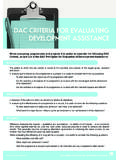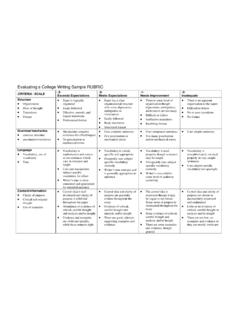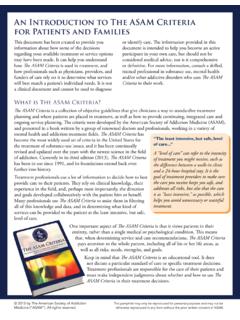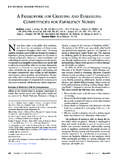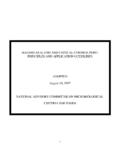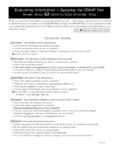Transcription of DEVELOPMENT ASSISTANCE COMMITTEE PRINCIPLES FOR …
1 DEVELOPMENT ASSISTANCE COMMITTEEPARIS 1991 PRINCIPLES FOR evaluation OF DEVELOPMENT ASSISTANCE2 TABLE OF OF AND OF DONORS AND CO-OPERATION8 VIII. evaluation AND IMPLEMENTATION OF , DISSEMINATION AND OF THESE PRINCIPLES AND FOLLOW-UP 113I. INTRODUCTION1. In response to its general mandate to strengthen the volume and developmental effectiveness of aid, the DAC has drawn up a series of policy PRINCIPLES addressing key areas of aid programming and management including Project Appraisal, Programme ASSISTANCE and Technical Co-operation. Aid evaluation plays an essential role in the efforts to enhance the quality of DEVELOPMENT co-operation. The following set of PRINCIPLES state the views of DAC Members on the most important requirements of the evaluation process based on current policies and practices as well as donor agency experiences with evaluation and feedback of results.
2 Donor/Recipient Partnership 2. DEVELOPMENT ASSISTANCE is a co-operative partnership exercise between donors and recipients. The developing countries are responsible for their own DEVELOPMENT and DEVELOPMENT ASSISTANCE can only be subsidiary and complementary to the efforts of the developing countries themselves. Aid supports activities for which developing countries have final responsibility and ownership. Project performance depends on both donor and recipient action. Both have an interest in, and responsibility for, the best use of scarce public funds. Both must therefore be interested in evaluation not only for improving resource use for DEVELOPMENT through learning from experience but also for accountability to political authorities and general publics.
3 3. The PRINCIPLES set out below have been prepared mainly for use by aid agencies for evaluating aid-financed activities. However, they should also be useful for developing country authorities in making their own evaluations of aid financed activities and, indeed, other public programmes and projects4 Central Conclusions and Complementarity to Other Aid Management PRINCIPLES 4. The PRINCIPLES focus on evaluation of both on-going and completed activities. They are complementary to previously agreed DAC PRINCIPLES on the management of DEVELOPMENT ASSISTANCE , notably, the PRINCIPLES for Project Appraisal adopted in 1988, and to the PRINCIPLES for Programme ASSISTANCE and the PRINCIPLES for New Orientations in Technical Co-operation.
4 Each of these PRINCIPLES contain recommendations for the use of evaluation for the specific aid instruments to which they apply. The PRINCIPLES set out below provide general guidance on the role of aid evaluation in the aid management process, with the following central messages: Aid agencies should have an evaluation policy with clearly established guidelines and methods and with a clear definition of its role and responsibilities and its place in institutional aid structure. The evaluation process should be impartial and independent from the process concerned with policy-making, and the delivery and management of DEVELOPMENT ASSISTANCE . The evaluation process must be as open as possible with the results made widely available.
5 For evaluations to be useful, they must be used. Feedback to both policy-makers and operational staff is essential. Partnership with recipients and donor co-operation in aid evaluation are both essential; they are an important aspect of recipient institution-building and of aid co-ordination and may reduce administrative burdens on recipients. Aid evaluation and its requirements must be an integral part of aid planning from the start. Clear identification of the objectives which an aid activity is to achieve is an essential prerequisite for objective evaluation . Definition 5. An evaluation is an assessment, as systematic and objective as possible, of an on-going or completed project, programme or policy, its design, implementation and results.
6 The aim is to determine the relevance and fulfilment of objectives, developmental efficiency, effectiveness, impact and sustainability. An evaluation should provide information that is credible and useful, enabling the incorporation of lessons learned into the decision-making process of both recipients and donors. 5II. PURPOSE OF EVALUATION6. The main purposes of evaluation are: to improve future aid policy, programmes and projects through feedback of lessons learned; to provide a basis for accountability, including the provision of information to the public. 7. Through the evaluation of failures as well as successes, valuable information is generated which, if properly fed back, can improve future aid programmes and projects.
7 Funds for DEVELOPMENT purposes are scarce compared to the needs, and stakeholders in donor and recipient countries should be enabled to draw to the fullest possible extent on experience to optimise resource use. 8. The accountability notion of evaluation referred to here relates to the developmental results and impact of DEVELOPMENT ASSISTANCE . It is distinct from accountability for the use of public funds in an accounting and legal sense, responsibility for the latter usually being assigned to an audit institution. Information about the results of DEVELOPMENT ASSISTANCE should be provided to the public and their leaders in both donor and recipient countries. 9. An important purpose of evaluation is to bring to the attention of policy-makers constraints on developmental aid success resulting from policy shortcomings or rigidities both on the donor and recipient side, inadequate co-ordination, and the effectiveness of other practices, such as procurement.
8 10. evaluation promotes the dialogue and improves co-operation between the participants in the DEVELOPMENT process through mutual sharing of experiences at all IMPARTIALITY AND INDEPENDENCE11. The evaluation process should be impartial and independent in its function from the process concerned with the policy making, the delivery and the management of DEVELOPMENT Impartiality contributes to the credibility of evaluation and the avoidance of bias in findings, analyses and conclusions. Independence provides legitimacy to evaluation and reduces the potential for conflict of interest which could arise if policy makers and managers were solely responsible for evaluating their own The requirement for impartiality and independence exists at all stages of the evaluation process, including the planning of the evaluation programme, the formulation of the terms of reference and the selection and approval of evaluation teams.
9 Independence of evaluation can be further enhanced where reports are issued in the name of authors. Institutional Structure for Managing evaluation 14. The institutional structure for managing evaluation is crucial to ensuring an effective evaluation process. The organisational aspects must address three requirements: developing a policy and a set of guidelines for evaluation ; ensuring impartiality and independence; linking evaluation findings to future activities. 15. Often, certain types of organisation will tend to strengthen one of the above requirements at the expense of others; , ensuring the independence of the process may weaken the potential for providing a strong linkage between the evaluation findings and decision-making.
10 An optimal solution should be sought to balance all of these requirements. 16. Impartiality and independence will best be achieved by separating the evaluation function from the line management responsible for planning and managing DEVELOPMENT ASSISTANCE . This could be accomplished by having a central unit responsible for evaluation reporting directly to the minister or the agency head responsible for DEVELOPMENT ASSISTANCE , or to a board of directors or governors of the institution. To the extent that some evaluation functions are attached to line management they should report to a central unit or to a sufficiently high level of the management structure or to a management COMMITTEE responsible for programme decisions.










